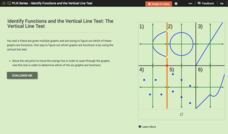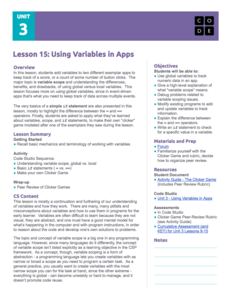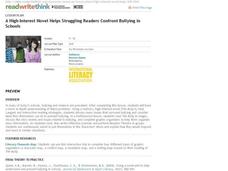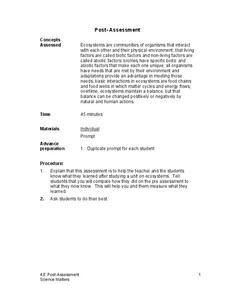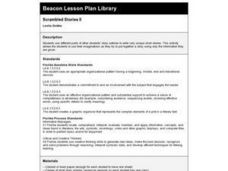CK-12 Foundation
Identify Functions and the Vertical Line Test: The Vertical Line Test
There's no easier test than the vertical line test. Learners drag a vertical line across the graphs of several relations in an interactive. They answer a set of challenge questions that focus on whether the graphs represent functions.
Code.org
Using Variables in Apps
Investigate the benefits of using global variables. The seventh installment of a 21-part unit continues the study of variables from the previous lesson. Young computer scientists modify two existing apps by adding variables and learn how...
Curated OER
My Antonia: Bloom’s Taxonomy Questions
How well do your pupils know My Antonia by Willa Cather? Take some time to create questions about the text. After examining a teacher model, individuals write questions that match each level of Bloom's Taxonomy and draft answers to these...
Friends of Fort McHenry
British Attacks in the Chesapeake during the War of 1812
This is a fun mapping activity that will have your class knowing the ins and outs of the battles in the War of 1812. Your young cartographers will not only plot decisive attacks, but will analyze their purpose, goals, and impact on...
Curated OER
Flowering Phenology: How Do Plants Know When To Flower?
Students explore the biotic and abiotic factors that affect plant reproduction and the potential consequences of human activities on plant populations. The effects of urbanization are discussed as an influence in the consequences.
Curated OER
Where Do I Fit In?: Mental Mapping Student Neighborhoods
Students examine geography through the themes of place, human/environment interaction, and region. They create a mental map of their own neighborhood, analyze their role in the world, and design a neighborhood that reflects their needs.
Curated OER
Bones Provide Great Support!
How do bones help people move around? A science investigation prompts kids to draw arrows to certain bones that protect their organs. After they finish, they trace their hands on a piece of paper and trace the way their bones go. Great...
ARKive
Species Discovery
How do you classify a newly discovered species? Learners view a presentation and complete research about biodiversity and the classification hierarchy. The lesson includes activities with dichotomous keys and work on classifying both...
Curated OER
Los Verbos Regulares
¡Vamos a practicar! Your beginning Spanish speakers need this well-organized, interactive PowerPoint to learn how to conjugate regular -ar verbs in the present tense. This resource provides scaffolding, and the slides build on one...
Shmoop
Coordinate Proofs
How do you know you know? Prove it! The guide goes through several examples and includes a link to a video to teach learners how to work through coordinate proofs. The goal is to prove that different shapes are indeed that shape.
Texas Education Agency (TEA)
Drawing Conclusions Based on the Sufficiency and Strength of Research (English III Reading)
High school juniors learn how to construct a strong argument by crafting a claim and using neutral language backed by evidence from reliable sources. To do so, they learn to evaluate sources and evidence to support claims. They then...
Curated OER
How Do I know That a Book Is Just Right for Me to Read?
Students choose a book for reading. In this language arts lesson, students take steps to evaluate a book for free reading. Students make a list of words found in the book that they are unfamiliar with.
Curated OER
The Chesapeake Bay in Captain John Smith's Time
When Captain John Smith visited the Chesapeake Bay in the summer of 1608, what types of animals and habitats did he encounter? Your young historians will analyze primary source documents to answer this question, as well as compare the...
Curated OER
Needs of Living Things
Students discuss and explore the needs of living things. They choose to create a slide show with captions, create a web showing the needs of one Organism using KidPix. or make picture book by hand or using Microsoft Publisher.
Curated OER
Micro-organisms
Students learn what a micro-organism is. In this micro-organism lesson plan, students understand that micro-organisms may be too small to see. Students learn microorganisms could be bacteria, fungi, something beneficial or a harmful...
ReadWriteThink
A High-Interest Novel Helps Struggling Readers Confront Bullying in Schools
Paul Langan's novel The Bully is the core text in a six-session unit plan that engages high schoolers in an in-depth examination of bullying and its effects on bullies, victims, and bystanders. The richly textured and carefully...
Curated OER
Garden of Eden
Students view a video clip about animals and their habitats. They work together to discuss how different animals adapt to their environments. They create a new habitat for a specific animal and draw new adaptations for them.
Curated OER
The Selection and Variation in the Egyptian Origami Bird
Learners participate in a contrived natural selection simulation in which they build and modify simple paper airplanes. They study divergent and convergent evolution and how it is isolated in sub-populations.
Serendip
Changing Biological Communities – Disturbance and Succession
After cutting down a forest to make a farm, how long would it take the environment to turn an abandoned farm back into a forest? Scholars study this exact scenario while they interpret many charts and graphs of the changing ecosystems as...
Curated OER
Green Stuff: Designing an Earth-Friendly Room
In this activity students explore earth-friendly materials that can be used in home environments. They learn about the relationship between the environment and design, and use a variety of problem-solving strategies. They work in...
Science Matters
Post-Assessment
Twenty questions make up an assessment designed to test super scientists' knowledge of ecosystems. Scholars answer multiple-choice and short-answer questions about organisms, food chains, energy flow, and more.
Curated OER
Scrambled Stories II
Review story elements with your class. They will use examples from a story to develop critical-thinking questions. Then they use a graphic organizer to describe the setting, character, and plot of the story, focusing on how they...
K12 Reader
Ecosystems
Examine how living and non-living things work together in a reading passage about ecosystems. Class members read the text and then respond to five response questions that relate specifically to the content of the passage.
Curated OER
The Chemical Building Blocks of Life
Amateur biologists examine the macromolecules that are foundational to life: proteins, lipids, and carbohydrates. This worksheet is composed of five pages of questions and plenty of space to write answers. Learners will explore such...


